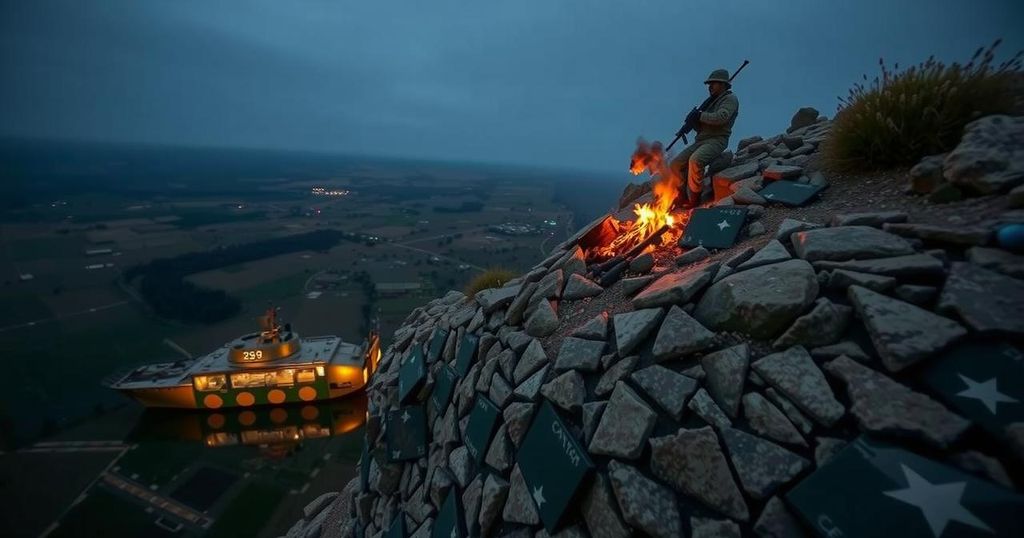The Russian military has increased its presence in nine observation posts in southern Syria to prevent potential Israeli escalations, particularly near the Golan Heights. Israeli construction of a separation wall has drawn UN accusations of ceasefire violations. Tensions have escalated due to Israel’s military actions, prompting concerns regarding international law violations and regional stability.
On November 19, Lebanese daily Al Akhbar reported that the Russian military has augmented its presence in nine observation posts located in southern Syria, specifically in coordination with the Syrian government. This maneuver aims to mitigate potential escalations from Israeli actions in the region. Moscow’s enhancement of these posts occurs in the Daraa and Quneitra governorates, areas adjacent to the Israeli-occupied Golan Heights, where Israel is reportedly advancing efforts to build a separation wall along the disengagement zone, akin to barriers established along its borders with Lebanon, Egypt, Gaza, and the West Bank.
Recent developments disclose that Israel’s construction activities associated with the wall have led to accusations from the United Nations of violating a longstanding ceasefire agreement established fifty years ago with Syria. Evidence from satellite imagery provided by the Associated Press illustrates significant construction as well as road developments extending over 7.5 kilometers along the Alpha Line, under the protection of Israeli armored vehicles and tanks.
Israeli Knesset member and former Defense Minister Avigdor Lieberman has issued a cautionary statement regarding Syria’s role as a support base for Israel’s adversaries, asserting, “If Syria continues to be used as a logistical base for our enemies, we will simply seize the Syrian part of Mount Hermon and will not relinquish it until further notice.”
These Israeli actions occur amidst a backdrop of heightened joint military operations between Russian and Syrian forces targeting groups with Western backing. Al Akhbar states that Russian troops are engaged in both aerial and ground surveillance activities to bolster security, facilitate the return of displaced persons, and uphold regional stability. This area had previously hosted Israeli-backed militants prior to a disengagement agreement mediated by Russia, which restored control to the Syrian government.
Haidar Mustafa, a columnist for The Cradle, characterized all Israeli actions within the Golan region, including the enforcement of Israeli citizenship, the expansion of settlements, and incursions into the disengagement zone for wall construction, as blatant breaches of international law. Following the escalation of conflict against Lebanon in late September, Israeli airstrikes against Syrian targets have notably increased, with frequent assaults occurring in major urban centers. Some of these strikes have come alarmingly close to Russia’s Hmeimim airbase in Latakia, triggering the activation of Russian air defense systems.
The situation in the Golan Heights reflects a complex geopolitical landscape involving Russia, Israel, Syria, and various military groups. The Golan Heights has been a contentious area since Israel occupied the region during the 1967 Six-Day War. Since then, tensions have persisted, particularly with Syria’s government attempting to regain sovereignty over the territory. Russia’s role as a mediator and supporter of Syrian President Bashar al-Assad has intensified following the civil conflict in Syria, leading to various military and diplomatic engagements in the region. Israel’s ongoing infrastructure projects and military actions have further complicated the fragile situation, raising concerns about violations of international law and regional stability.
In summary, the bolstering of Russian military presence near the Golan Heights highlights the delicate balance of power in the region. Increased Israeli constructions and military actions have provoked condemnation from various entities, including the United Nations, due to perceived violations of ceasefire agreements. The evolving dynamics between Russia, Syria, and Israel continue to shape the geopolitical landscape, underscoring the necessity for diplomatic solutions to prevent further escalations and ensure regional stability.
Original Source: thecradle.co






